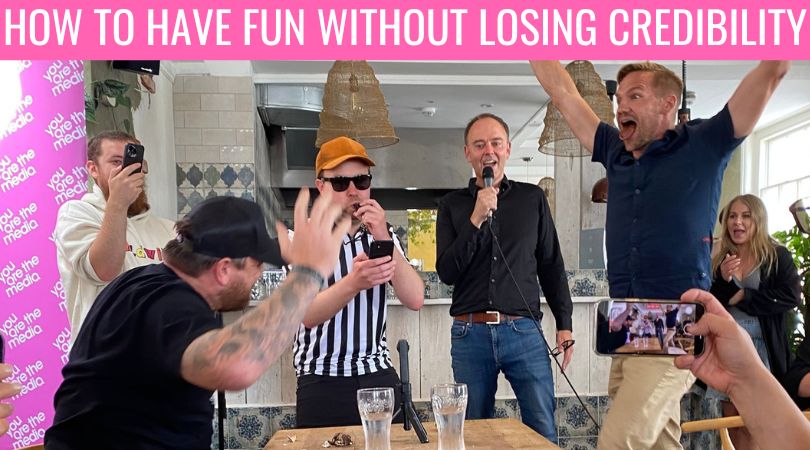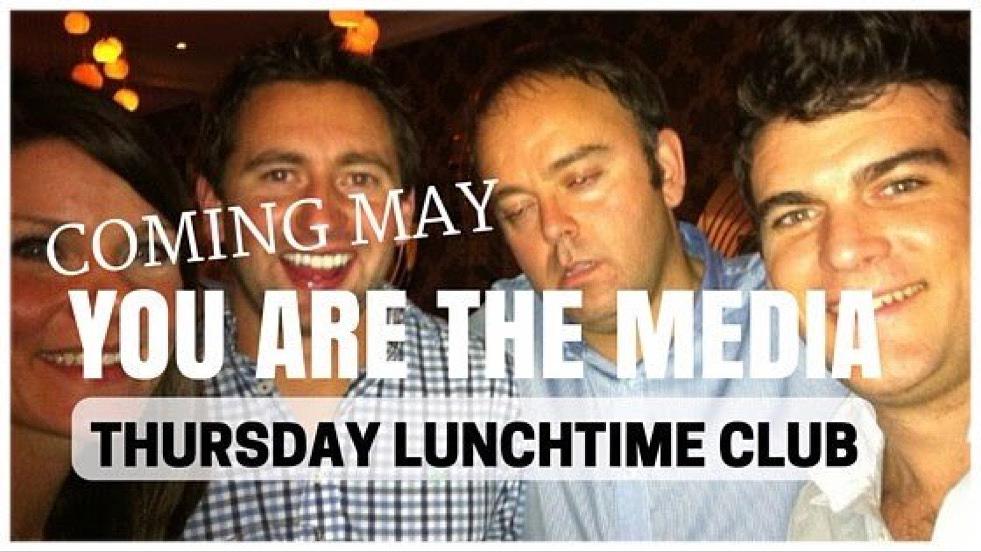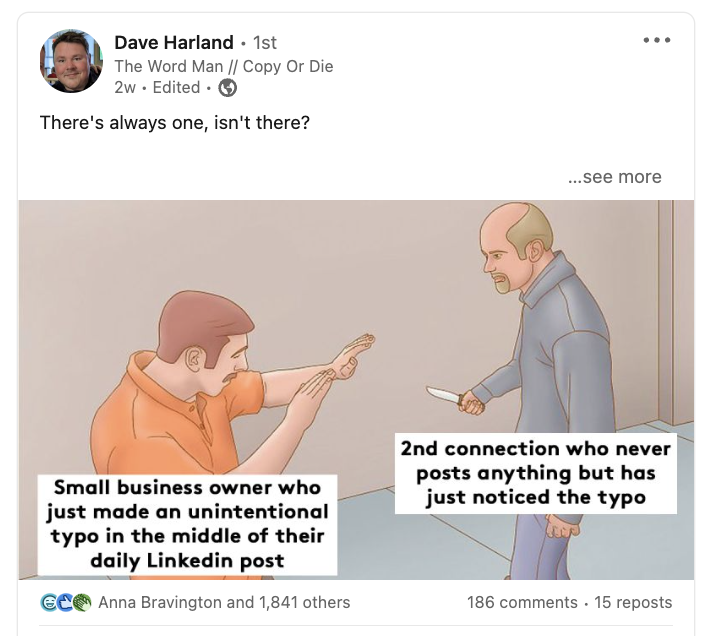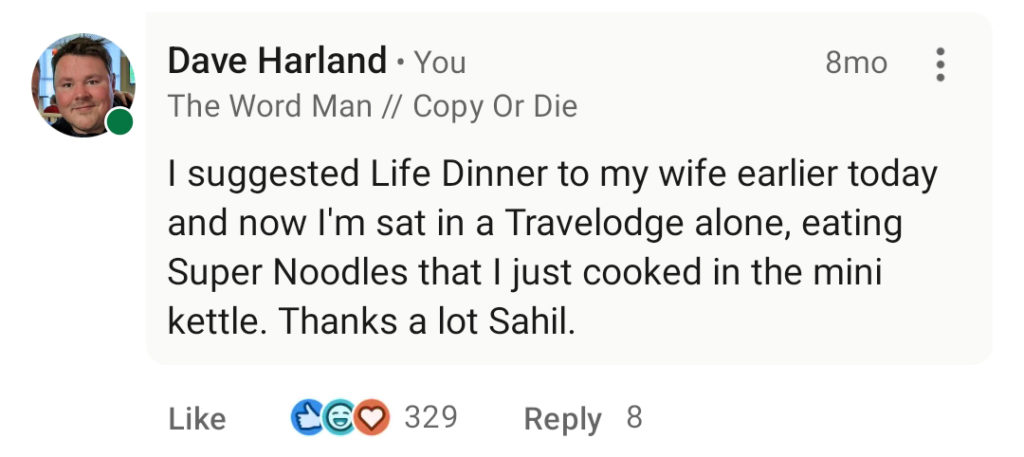How To Unleash Your Fun Side Without Losing Credibility

Your fun side can co-exist with a command of respect. The balance comes down to what you stand for.
Getting a laugh can make you relatable, plus it feels good, but it’s imperative not to sacrifice credibility for the sake of the punchline.
Every action we make contributes to our personal brand, it’s knowing how our narrative fits with our values and the stories we tell.
Let me share a question that has sat with me recently, maybe it’s something you have thought about too. Can you be taken seriously if you bring your own quirks and humour?
My Own Story
A problem I had when it came to my humour and how that has been represented from a business perspective, is that it can be seen as quite chaotic.
The humour I have always sided with is very much with an anarchic angle. Whilst it’s the unpredictable nature that has always sided with me, it also makes me think, how does that look to other people?
Let me share with you what I mean (with this example).

When we started our live events in 2016, I used this image to promote our very first YATM Lunch Club. I found it on my camera reel. It’s a picture of me, looking worse for wear with friends. Let’s put this into context, this is to promote a business event for people to attend.
Whilst on one side, it’s there to laugh at myself, so ticks the boxes of humility and honesty, looking back now, it asks the question, who would want to attend an event when that becomes the main image to sell the event?
Taking it further, the way I presented at other business events/seminars was based on a lot of shouting. To some people, this is just not what they signed up to. It’s never a nice feeling when you see someone stand up and walk out. In fact, it’s embarrassing.
My problem is that what was seen as carelessness and erratic, was part of the way I delivered.
Over the years, perhaps I have toned down my disjointed approach and learned that it is the values that I lead by that makes the humour more accepted. For instance, I have learned to be more poised and considered when wanting to get a serious point across. It’s never about toning down to fit in, or compromising everything you do, but to appreciate the message you want to get across and then how our personalities and quirks can complement that.
Mark Schaefer points to the impression we leave, ‘The world needs humour! However, the one thing we have to remember is that everything we do, and everything we don’t do, becomes part of our personal brand.’
What I have learned over the years is that you need to let your guard down without distancing yourself from your audience. Crafting a narrative that harmoniously combines fun with a clear and purposeful message is how it all gels together.
To be honest with you, I used humour as a way to self-destruct, not as a tool to bring people closer.
Why People Put The Brakes On Letting Their Guard Down
Bringing humour and our fun side is undeniably valuable, but there is a hurdle everyone has to get over – subjectivity.
What one person may find funny, could be polar opposite to someone else. The risk of a delivery being misinterpreted or even worse, causing offence makes deploying humour for many people, a challenging approach.
If you keep going where you treat humour with gravity and in my case, lean even more into the chaos, it can distance people. Whilst we’re never meant to be here for everyone, we don’t want to create a barrier for people to make that step forward.
What Do Others Think?
I asked others if you can be taken seriously if you bring your own quirks and humour?
Jon Jenkins is an accountant (sign up to his Pragmatist newsletter), so represents what can be seen as a pretty serious industry. Jon says, ‘When you cut to the chase and the offer of work comes up who do you want in your corner? Serious business Jon who comes across as knowledgeable and dependable or crazy Jon who can’t keep it together?
“It all depends on your relationship with that person. It’s like unpeeling the layers of an onion. Little by little we become more comfortable with each other and reveal a bit more of ‘us’. By the time you reveal the whole you, they know you can do your work with your eyes closed and be enjoyable company at the same time. The two do not need to be independent. If you lead with drunk funny Jon though they have no reference point other than that. Not conducive to the start of a great business relationship.’
According to Liam Toms, Communications & Engagement Manager at Grapevine, there is an appreciation of reading the room and who you are addressing. ‘I think if your humour ever feels like it doesn’t land in work, perhaps it is because people aren’t expecting it and their immediate interpretation is that certain codes have been broken and they don’t know how to react in those first few moments.’
Copywriter, Westrow Cooper points to the acknowledgment that taking things too far can ruin a career, ‘Humour can come back to bite you. Remember Gerald Ratner who destroyed his business in a single week by jokingly referring to their jewellry as “crap.” But the funny thing was he had made the same joke on previous occasions and no one had taken any notice.’
How You Can Find That Balance So It Elevates Who You Are
Mark Twain rightly said humour is indeed mankind’s greatest blessing.
To wield humour effectively, it’s important to avoid treating it too seriously. If it can be a way to galvanise people, even better.
I am a big fan of what Dave Harland creates. Dave is a copywriter who is joining forces with Ben McKinney to create the copy agency Copy Or Die.
Dave has built a profile on LinkedIn as the voice for those who are tired of the coercion, stories of success and the people who tell us how to live our lives, their way, particularly on LinkedIn. Dave stands up for us all as the champion for being normal. This is what makes Dave relatable and his use of words, with a nod to his audience and the ability to express how we all really think is a huge skill to have. This is what makes Dave a sought-after copywriter.

Here is Dave’s response to Sahil Bloom’s life dinner LinkedIn post, you can read that here.

The ability to have fun requires honesty and creativity, this runs counter to the seriousness of the industries we may represent.
Some Ideas To Approach In Your Work
Embracing humour in your work helps in dealing with unexpected situations and gives people a sense of who you are that they can feel comfortable with. This is what I have been working on.
Nurture Your Audience.
This is where you concentrate on the delivery of your message, without being fixated on the laughs you can get. For instance, isolate one aspect at a time, so you can start to see more clearly when your message starts to work, or what needs to be adjusted.
Contextual example – I learned the hard way, that it’s not about being anarchic in your delivery, all the time. Whilst that is still part of who I am, it’s important to pause and give structure. A mishap becomes a lesson in refining your delivery. For instance, YATM Lunch Club events follow a structured format.
Your Approach Becomes Part Of A Bigger Story
This is about resonating with your audience and where you bring humour into your narrative. What it does is add depth to your message. Stories from personal experiences can help magnify the impact of your message.
Contextual example – my early attempts lacked a cohesive narrative, there wasn’t something there for someone else to relate to. Shouting and deliberate self-destruction were overshadowing the underlying story. For instance, at YATM Creator Day I shared an origin story where YATM started as an 11-year-old me at school. Connecting experiences to a bigger picture became my focus.
Leverage What Gives You Fire In Your Belly.
List the values you have and craft the fun side around them. The areas you have become knowledgeable in, have happened because of your passion. What starts to happen is you find compelling reasons to add humour.
Contextual example – As I stumbled through, I discovered how it became easier to weave humour around my beliefs and what I stand for (creativity, community, independence, self-sufficiency). It became easier to introduce quirky ideas when I focused on what I truly believed in.
Find Logical Connections Between Your Work & Your Personality
This is about finding extended engagement on a topic. You have so much freedom when you can bring yourself into your work and a topic you want to be vocal about. Finding absurd connections between disparate ideas keeps the audience hooked.
Contextual Example – isolated ways to gain attention or trying hard to be funny doesn’t work, I had to find connections that complemented the work I produce and the personality that I have. For instance, being creative doesn’t mean everything is going to work. I’m ok with sharing the soundbites where it doesn’t go according to plan. It helps make me relatable.
Let’s Round-Up
Building trust is the result of purpose, fun and performance co-existing.
Your fun side is most effective when it comes from your personality, perspective and experience. What happens is that it contributes to the rapport that you build and the camaraderie you gain.
The challenge is not about whether you can be taken seriously whilst showcasing your fun side, it’s about knowing the values you have that allow you to open up. It means you start to embrace humour as a powerful tool, wielded with wisdom and an understanding of your audience.
I still have that archaic side to me, but today it’s not to the detriment of the people who make that decision to stand beside me. It’s every laugh shared that is a step towards a more genuine connection. When it connects to who we are, we can build an even more compelling personal brand.
By the way, Dave Harland is coming to YATM Creator Day. Read more and book your place here.


